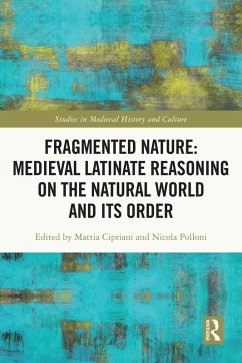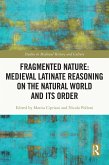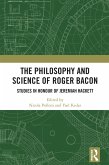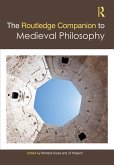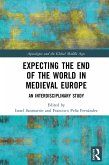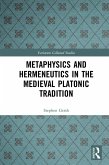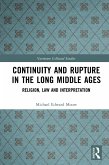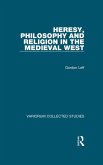Fragmented Nature: Medieval Latinate Reasoning on the Natural World and Its Order (eBook, PDF)
Redaktion: Cipriani, Mattia; Polloni, Nicola
42,95 €
42,95 €
inkl. MwSt.
Sofort per Download lieferbar

21 °P sammeln
42,95 €
Als Download kaufen

42,95 €
inkl. MwSt.
Sofort per Download lieferbar

21 °P sammeln
Jetzt verschenken
Alle Infos zum eBook verschenken
42,95 €
inkl. MwSt.
Sofort per Download lieferbar
Alle Infos zum eBook verschenken

21 °P sammeln
Fragmented Nature: Medieval Latinate Reasoning on the Natural World and Its Order (eBook, PDF)
Redaktion: Cipriani, Mattia; Polloni, Nicola
- Format: PDF
- Merkliste
- Auf die Merkliste
- Bewerten Bewerten
- Teilen
- Produkt teilen
- Produkterinnerung
- Produkterinnerung

Bitte loggen Sie sich zunächst in Ihr Kundenkonto ein oder registrieren Sie sich bei
bücher.de, um das eBook-Abo tolino select nutzen zu können.
Hier können Sie sich einloggen
Hier können Sie sich einloggen
Sie sind bereits eingeloggt. Klicken Sie auf 2. tolino select Abo, um fortzufahren.

Bitte loggen Sie sich zunächst in Ihr Kundenkonto ein oder registrieren Sie sich bei bücher.de, um das eBook-Abo tolino select nutzen zu können.
This book focuses on this tension between order and randomness, and idealisation and reality of nature in the Middle Ages.
- Geräte: PC
- mit Kopierschutz
- eBook Hilfe
Andere Kunden interessierten sich auch für
![Fragmented Nature: Medieval Latinate Reasoning on the Natural World and Its Order (eBook, ePUB) Fragmented Nature: Medieval Latinate Reasoning on the Natural World and Its Order (eBook, ePUB)]() Fragmented Nature: Medieval Latinate Reasoning on the Natural World and Its Order (eBook, ePUB)42,95 €
Fragmented Nature: Medieval Latinate Reasoning on the Natural World and Its Order (eBook, ePUB)42,95 €![The Philosophy and Science of Roger Bacon (eBook, PDF) The Philosophy and Science of Roger Bacon (eBook, PDF)]() The Philosophy and Science of Roger Bacon (eBook, PDF)40,95 €
The Philosophy and Science of Roger Bacon (eBook, PDF)40,95 €![The Routledge Companion to Medieval Philosophy (eBook, PDF) The Routledge Companion to Medieval Philosophy (eBook, PDF)]() The Routledge Companion to Medieval Philosophy (eBook, PDF)46,95 €
The Routledge Companion to Medieval Philosophy (eBook, PDF)46,95 €![Expecting the End of the World in Medieval Europe (eBook, PDF) Expecting the End of the World in Medieval Europe (eBook, PDF)]() Expecting the End of the World in Medieval Europe (eBook, PDF)42,95 €
Expecting the End of the World in Medieval Europe (eBook, PDF)42,95 €![Metaphysics and Hermeneutics in the Medieval Platonic Tradition (eBook, PDF) Metaphysics and Hermeneutics in the Medieval Platonic Tradition (eBook, PDF)]() Stephen GershMetaphysics and Hermeneutics in the Medieval Platonic Tradition (eBook, PDF)41,95 €
Stephen GershMetaphysics and Hermeneutics in the Medieval Platonic Tradition (eBook, PDF)41,95 €![Continuity and Rupture in the Long Middle Ages (eBook, PDF) Continuity and Rupture in the Long Middle Ages (eBook, PDF)]() Michael Edward MooreContinuity and Rupture in the Long Middle Ages (eBook, PDF)42,95 €
Michael Edward MooreContinuity and Rupture in the Long Middle Ages (eBook, PDF)42,95 €![Heresy, Philosophy and Religion in the Medieval West (eBook, PDF) Heresy, Philosophy and Religion in the Medieval West (eBook, PDF)]() Gordon LeffHeresy, Philosophy and Religion in the Medieval West (eBook, PDF)54,95 €
Gordon LeffHeresy, Philosophy and Religion in the Medieval West (eBook, PDF)54,95 €-
-
-
This book focuses on this tension between order and randomness, and idealisation and reality of nature in the Middle Ages.
Dieser Download kann aus rechtlichen Gründen nur mit Rechnungsadresse in A, B, BG, CY, CZ, D, DK, EW, E, FIN, F, GR, HR, H, IRL, I, LT, L, LR, M, NL, PL, P, R, S, SLO, SK ausgeliefert werden.
Produktdetails
- Produktdetails
- Verlag: Taylor & Francis eBooks
- Seitenzahl: 228
- Erscheinungstermin: 9. Juni 2022
- Englisch
- ISBN-13: 9781000599954
- Artikelnr.: 63752108
- Verlag: Taylor & Francis eBooks
- Seitenzahl: 228
- Erscheinungstermin: 9. Juni 2022
- Englisch
- ISBN-13: 9781000599954
- Artikelnr.: 63752108
- Herstellerkennzeichnung Die Herstellerinformationen sind derzeit nicht verfügbar.
Mattia Cipriani currently holds an Alexander von Humboldt Research Fellowship at the Freie Universität Berlin, Germany. His research focuses on Thomas of Cantimpré's Liber de natura rerum, on medieval encyclopaedism, and on the transmission of naturalistic ideas and texts. Nicola Polloni has worked at the universities of Pavia, Durham, and Berlin. Since 2020, he is FWO Senior Research Fellow at KU Leuven, Belgium. His research expands cross-disciplinarily on medieval hylomorphism and theories of matter.
Chapter 1 Zoological Inconsistency and Confusion in the Physiologus latinus / Chapter 2 Gerald of Wales and Saint Brigid's Falcon: The Chaste Beast in Medieval and Early Modern Irish Natural History / Chapter 3 Medieval Universes in Disorder: Primeval Chaos and Its Authoritative Coordinates / Chapter 4 Animals under an Encyclopedic Lens: Zoological Misinterpretation in Thomas of Cantimpré's Liber de Natura Rerum / Chapter 5 Learning from Bees, Wasps, and Ants: Communal Norms, Social Practices, and Contingencies of Nature in Medieval Insect Allegories / Chapter 6 Defining and Picturing Elements and Humours in Medieval Medicine: Text and Images in Bartholomew the Englishman's De Proprietatibus Rerum / Chapter 7 Why Do Animals Have Parts? Organs and Organisation in Thirteenth- and Fourteenth-century Latin Commentaries on Aristotle's De animalibus / Chapter 8 La reproduction imparfaite: les "gusanes" et l'état larvaire des insectes chez Albert le Grand / Chapter 9 Elixir as Means of Contrasting with Nature in Albert the Great's Alchemy / Chapter 10 From Prime Matter to Chaos in Ramon Llull
Chapter 1 Zoological Inconsistency and Confusion in the Physiologus latinus / Chapter 2 Gerald of Wales and Saint Brigid's Falcon: The Chaste Beast in Medieval and Early Modern Irish Natural History / Chapter 3 Medieval Universes in Disorder: Primeval Chaos and Its Authoritative Coordinates / Chapter 4 Animals under an Encyclopedic Lens: Zoological Misinterpretation in Thomas of Cantimpré's Liber de Natura Rerum / Chapter 5 Learning from Bees, Wasps, and Ants: Communal Norms, Social Practices, and Contingencies of Nature in Medieval Insect Allegories / Chapter 6 Defining and Picturing Elements and Humours in Medieval Medicine: Text and Images in Bartholomew the Englishman's De Proprietatibus Rerum / Chapter 7 Why Do Animals Have Parts? Organs and Organisation in Thirteenth- and Fourteenth-century Latin Commentaries on Aristotle's De animalibus / Chapter 8 La reproduction imparfaite: les "gusanes" et l'état larvaire des insectes chez Albert le Grand / Chapter 9 Elixir as Means of Contrasting with Nature in Albert the Great's Alchemy / Chapter 10 From Prime Matter to Chaos in Ramon Llull
